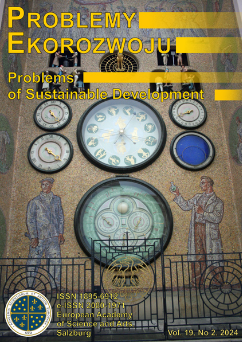Does the Evangelical Understanding of the Concept of Property Serve Sustainable Development?
Karolina Szulc
Poznan University of Life Sciences, Faculty of Animal Breeding and Biology, Department of Pig Breeding and Production, 33 Wolynska St, Poznan 60-637 (Poland)
Abstract
Protestant Reformation brought about some revolutionary changes in the ways that God and human role in the world were perceived. Martin Luther, known as the Father of the Reformation, adhered to the principle sola scriptura – only Scripture, and hence based all his teachings on the Word of God. The understanding of ownership proposed by him was also a faithful reflection of biblical teaching. According to Luther, the true meaning of ownership was servanthood – God bestowed goods to man in order for him to share his possessions with others. The Reformer did not perceive property as a value on its own. Rather, a man’s attitude to property reflected his attitude towards his neighbour and the creation as a whole. People should not forget that all their possessions have merely been temporarily entrusted to them by God.
This Biblical principle has been elaborated on by evangelical theologians. Modern reflection emphasizes that the idea of ownership is not confined to material goods, but encompasses various elements of the surrounding world. Consequently, care for the creation and natural environment should be viewed as Christian responsibility. Man was created in God’s image and likeness, and is known to be the crown of creation. Evangelical theologians point out that Christians should be particularly sensitive to issues of environmental protection and preserving this world for future generations. Responsibility for the surrounding world should not be a burdensome duty. It ought to be an expression of love for God and one’s neighbour, a proof of deeper understanding of the meaning of Christianity. All in all, it is the fullest realization of the idea of sustainable development.
Keywords:
ownership, Christian responsibility, Reformation, sustainable developmentReferences
BENEDYKTOWICZ W., Co powinniśmy czynić. Zarys ewangelickiej etyki teologicznej, ChAT Warszawa 1993
Google Scholar
BOCHENEK K., 2010, Niektóre aspekty zrównoważonego rozwoju w świetle chrześcijańskiej filozofii średniowiecznej, in: Problemy Ekorozwoju/Problems of Sustainable Development, vol. 5, no 1, p. 71-79.
Google Scholar
BOŁTROMIUK A., 2010, Polskie społeczeństwo wobec idei i zasad zrównoważonego rozwoju, in: Problemy Ekorozwoju/Problems of Sustainable Development, vol. 5, no 2, p. 107- 116.
Google Scholar
GAWOR L., 2010, Filozofia zrównoważonego rozwoju – preliminaria. in: Problemy Ekorozwoju/Problems of Sustainable Development, vol. 5, no 2, p. 69-76.
Google Scholar
HINTZ M., Chrześcijańskie sumienie. Rozważania o etyce ewangelickiej, Wydawnictwo Głos Życia 2006.
Google Scholar
HINTZ M., Etyka ewangelicka i jej wymiar eklezjalny – studium historyczno-systematyczne, Chrześcijańska Akademia Teologiczna 2007.
Google Scholar
HINTZ M., 2009, Teologiczne aspekty ewangelickiego etosu pracy, in: Gdański Rocznik Ewangelicki, vol. III, p. 29-43.
Google Scholar
JAGUDZKI A., Z Chrystusem przez świat. Chrześcijanin w Kościele i świecie, Warszawa 1975.
Google Scholar
KUZIOR A., 2006, Człowiek jako racjonalny podmiot działań w świetle założeń koncepcji zrównoważonego rozwoju, in: Problemy Ekorozwoju/Problems of Sustainable Development, vol. 2, no 1, p. 67-72.
Google Scholar
NAUMOWICZ C., 2009, Eko-teologia jako forma chrześcijańskiej diakonii wobec stworzenia, in: Studia Ecologiae et Bioethicae, 7, p. 221-235.
Google Scholar
PIĄTEK Z., Człowiek jako podmiot zrównoważonego rozwoju: konsekwencje filozoficzno-społeczne, in: ed. Papuziński A. Zrównoważony rozwój. Od utopii do praw człowieka, Branta, Bydgoszcz 2005, p. 16.
Google Scholar
PAWŁOWSKI A., 2009, The Sustainable Development Revolution, in: Problemy Ekorozwoju/Problems of Sustainable Development, vol. 4, no 1, p. 65-76.
Google Scholar
PAWŁOWSKI A., PAWŁOWSKI L., 2008, Zrównoważony rozwój we współczesnej cywilizacji. Część 1: Środowisko a zrównoważony rozwój, in: Problemy Ekorozwoju/Problems of Sustainable Development, vol. 3, no 1, s. 53-65.
Google Scholar
REDCLIFT M. R., 2009, Sustainable Development (1987-2005) – an Oxymoron Comes of Age, in Problemy Ekorozwoju/Problems of Sustainable Development, vol. 4, no 1, p. 33-50.
Google Scholar
SMODEREK K., 2011, Review: W. Bołoz, „Kościół i ekologia. W obronie człowieka i środowiska naturalnego”, Homo Dei, Kraków 2010, in: Problemy Ekorozwoju/Problems of Sustainable Development, vol. 6, no 1, p. 155- 157.
Google Scholar
SZTUMSKI W., 2008, Refleksja na temat rozwoju zrównoważonego (Czy rozwój zrównoważony jest fikcją, utopią, iluzja czy oszustwem?), in: Problemy Ekorozwoju/Problems of Sustainable Development, vol. 3, no 2, p.133-139.
Google Scholar
SZAREK A., 2004, Mieć czy być? Jaki jest stosunek chrześcijan do dóbr materialnych, in: Przegląd Ewangelicki 1, p. 34-43.
Google Scholar
TUZIAK A., 2010, Społeczno-ekonomiczne aspekty zrównoważonego rozwoju w ujęciu globalnym i lokalnym, in: Problemy Ekorozwoju/Problems of Sustainable Development, vol. 5, no 2, p. 39-49.
Google Scholar
UDO V., PAWŁOWSKI A., 2010, Human Progress Towards Equitable Sustainable Development: A Philosophical Exploration, in: Problemy Ekorozwoju/Problems of Sustainable Development, vol. 5, no 1, p. 23-44.
Google Scholar
UGLORZ M., Marcin Luter Ojciec Reformacji, Wydawnictwo Augustana 1995.
Google Scholar
Nowa Encyklopedia Powszechna PWN – tom 5, PWN, Warszawa 1996.
Google Scholar
UGLORZ M.J., Ekologiczne wątki w biblijnej historii zbawienia, Wydawnictwo Augustana, Bielsko-Biała 2010.
Google Scholar
WODZIKOWSKI CZ., 2009, Zrównoważony rozwój w dyskursie nad koncepcją ochrony przyrody w Polsce po 1989 r., in: Problemy Ekorozwoju/Problems of Sustainable Development, vol. 4, no 1, p. 83-92.
Google Scholar
Authors
Karolina SzulcPoznan University of Life Sciences, Faculty of Animal Breeding and Biology, Department of Pig Breeding and Production, 33 Wolynska St, Poznan 60-637 Poland
Statistics
Abstract views: 14PDF downloads: 6
License

This work is licensed under a Creative Commons Attribution-ShareAlike 4.0 International License.




